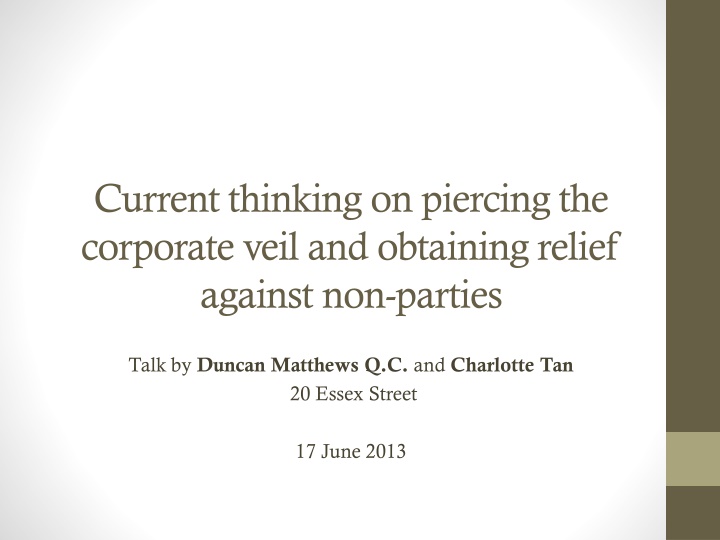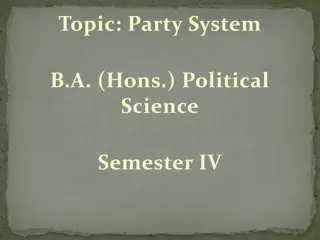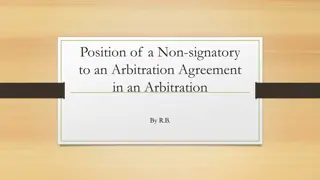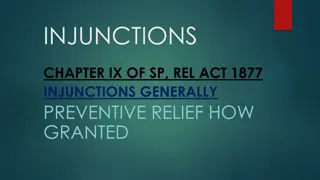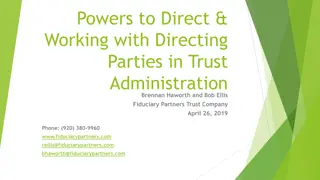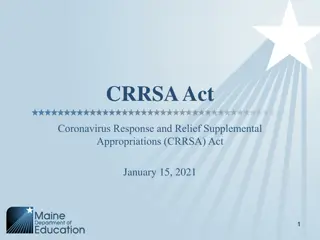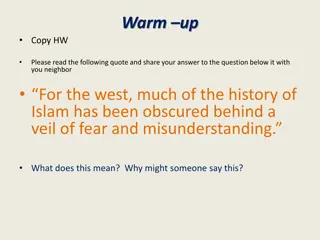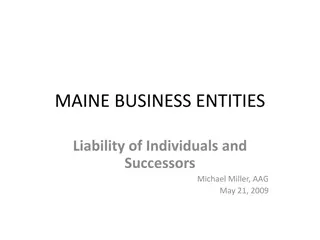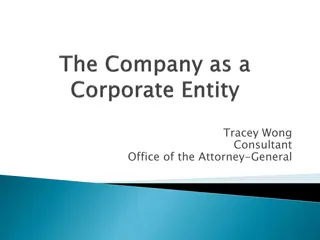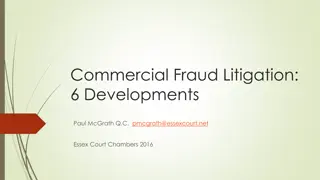Current Thinking on Piercing the Corporate Veil and Obtaining Relief Against Non-Parties
Duncan Matthews Q.C. and Charlotte Tan from 20 Essex Street presented on the expansionist and restrictive approaches to piercing the corporate veil, focusing on freezing injunctions against cause of action defendants. The talk highlighted key cases like VTB v. Nutritek and Petrodel v. Prest, discussing the challenges and strategies in obtaining relief against non-parties involved in corporate wrongdoing.
Download Presentation

Please find below an Image/Link to download the presentation.
The content on the website is provided AS IS for your information and personal use only. It may not be sold, licensed, or shared on other websites without obtaining consent from the author.If you encounter any issues during the download, it is possible that the publisher has removed the file from their server.
You are allowed to download the files provided on this website for personal or commercial use, subject to the condition that they are used lawfully. All files are the property of their respective owners.
The content on the website is provided AS IS for your information and personal use only. It may not be sold, licensed, or shared on other websites without obtaining consent from the author.
E N D
Presentation Transcript
Current thinking on piercing the corporate veil and obtaining relief against non-parties Talk by Duncan Matthews Q.C. and Charlotte Tan 20 Essex Street 17 June 2013
Introduction 1. Expansionist approach: freezing injunctions against cause of action defendants 1. Restrictive approach: a. Chabra juridiction; The Mahakam [2012] 2 All ER (Comm) 513 a. Piercing the corporate veil; VTB v Nutritek [2013] 2 W.L.R. 398 and Petrodel v Prest [2013] UKSC 34
Expansionist approach: freezing injunctions against CAD defendants Freezing injunctions: one of the law s two nuclear weapons : per Donaldson LJ, Bank Mellat v Nikpour [1985] F.S.R. 87 at 92 we live in a time of rapidly growing commercial and financial sophistication and it behoves the courts to adapt their practices to meet the current wiles of those defendants who are prepared to devote as much energy to making themselves immune to the court s orders as to resisting the making of such orders on the merits of their case : per Lord Donaldson, Derby v Weldon (Nos 3 and 4) [1990] 2 Ch 65 at p77 international fraud is nowadays of growing concern in the international community if anything it has grown in recent years : per Patten LJ, BTA v Solodchenko [2011] 1 WLR 888 at [53]
Expansionist approach: freezing injunctions against CAD defendants BTA v Ablyazov [2009] EWHC 2840 (Comm) Continuation inter partes of Freezing Injunction obtained ex parte, including continuation of passport retention following Bayer v Winter [1986] 1 WLR 497. BTA v Ablyazov [2009] EWHC 3267 (Comm) Defendant restrained from dealing with any of his assets worldwide, even in excess of the amount of the claim (plus interest and costs), if his assets in England and Wales are less than the amount of the claim. BTA v Ablyazov [2010] EWHC 1779 (Comm); [2010] EWCA Civ 1141 Imposing receivership in aid of Freezing Order; continuing passport retention order in aid of Freezing Order; restricting the scope of the ordinary course of business permission. BTA v Ablyazov [2010] EWHC 2219 Disclosure order in support of Freezing Order may extend to information leading to the identity of further wrong-doers (even if the Defendants and/or those further wrong-doers are in another jurisdiction) and may be backed with debarring unless order even if the Freezing Order is subject to jurisdictional challenge.
Expansionist approach: freezing injunctions against CAD defendants BTA v Solodchenko [2011] 1 WLR 888 Freezing Order can extend to assets where Defendant holds legal but not beneficial interest (English Commercial Court Standard Form). BTA v Ablyazov [2011] EWHC 1522 (Comm); [2012] 1 WLR 1988 Contempt hearing for breach of freezing order may precede trial on the merits to reinforce compliance with freezing order despite overlap of credibility and even substantive issues; it may also be ordered to proceed on some counts with the others to remain in abeyance subject to further order, leaving the Defendant exposed to risk of further (on-going) committal applications. BTA v Ablyazov [2011] EWHC 2506 (Comm); [2012] EWCA Civ 564 Defendant may have relief from sanctions revoked and be debarred from defending the action for non-compliance with disclosure obligations imposed ancillary to freezing order and subsequent non- compliance with conditions of relief against sanction, especially where the Court has been misled and without necessarily requiring a full trial of the issue as to whether the Court has been misled.. BTA v Ablyazov [2012] EWHC 455 (Comm); [2012] EWCA Civ 1411 Defendant who has been ordered to be committed to prison for contempt of court for breach of Freezing Order may be ordered to surrender himself to the authorities to serve his sentence and debarred from defending the proceedings if he fails to comply; so also may such a Defendant be ordered to serve a fresh disclosure affidavit and debarred from defending the proceedings if he fails to comply. This is to bring further pressure to bear on a Defendant to comply with a Freezing Order and even where the Defendant s non-compliance is not said to have any impact on the ability of the Court to conduct a fair trial of the issues in the action.
Restrictive approach: Chabrajurisdiction TSB Private Bank International SA v Chabra [1992] 1 WLR 231 I am of the view that there is a good arguable case that there are assets, apparently vested in the company, which may be beneficially the property of Mr. Chabra and therefore available to satisfy the plaintiff's claims against him if established at trial the company is nothing more than a convenient repository for Mr. Chabra's assets SCF Finance Co Ltd v Masri (No.1) [1985] 1 WLR 876 (CA) Where a plaintiff invites the court to include within the scope of a Mareva injunction assets which appear on their face to belong to a third party, e.g. a bank account in the name of a third party, the court should not accede to the invitation without good reason for supposing that the assets are in truth the assets of the defendant.
Restrictive approach: Chabra jurisdiction Parbulk v Humpuss Intermoda Transportasi (The Mahakam) [2012] 2 All E.R. (Comm) 513 Linsen v Humpuss Sea Transport [2011] 2 Lloyd's Rep. 663 (Flaux J)
Restrictive approach: Chabra jurisdiction Parbulk v Humpuss Intermoda Transportasi (The Mahakam) [2012] 2 All E.R. (Comm) 513 Usually, but not invariably, a freezing order will be directed at assets beneficially owned by the principal defendant (emphasis added) where a defendant/judgment debtor (i.e. a cause of action defendant ( CAD ) has a debt, or other receivable owing to it by a third party NCAD, or a claim, or potential claim, against a third party NCAD, the English court has jurisdiction (or legal power as Aikens J put it) to grant a freezing order against the third party NCAD, in appropriate circumstances, to restrain the NCAD from dissipating its assets up to the amount of its debt to, or the claim by, the CAD or judgment debtor. Such an order is doing no more than protecting the right, or contingent right, of the claimant (whether by a third party debt order, charging order, appointment of a receiver or liquidator etc.) to obtain satisfaction of its judgment debt against the defendant by means of attachment, or other collection, of the proceeds of the latter's receivable from, or claim against, the third party (emphasis added) Normally, if there is no reason to doubt the propriety of the third party, it may well be sufficient, for example, to injunct the defendant from collecting the receivable, otherwise than by instructing the third party to pay it into a designated account. In other circumstances, it may be appropriate, at an interlocutory stage, to appoint a receiver over the receivable/claim against the third party in order to enable the receiver to collect it and pay it into court, or an escrow account, or otherwise preserve the receivable/claim from dissipation by the defendant/judgment debtor. But if, for example, the circumstances show collusion, or impropriety, or some participation, on the part of the third party, in attempts by the defendant/judgment debtor to render itself judgment proof, then it may be appropriate for a freezing order to be granted against the third party itself (emphasis added)
Restrictive approach: Chabra jurisdiction Linsen v Humpuss Sea Transport [2011] 2 Lloyd's Rep. 663 It is not enough that the CAD could, if it chose, cause the assets held by the NCAD to be used to satisfy the judgment. It is necessary that the court be satisfied that there is good reason to suppose either (i) that the CAD can be compelled (through some process of enforcement) to cause the assets held by the NCAD to be used for that purpose; or (ii) that there is some other process of enforcement by which the claimant can obtain recourse to the assets held by the NCAD. (emphasis added)
Restrictive approach: Chabra jurisdiction Parbulk v Humpuss Intermoda Transportasi (The Mahakam) [2012] 2 All E.R. (Comm) 513 the court nonetheless has to consider whether it is appropriate in any given case to make an order injuncting the foreign assets of such a defendant, by reference to considerations of subject matter jurisdiction and principles of international comity. (emphasis added) sufficient connection with this jurisdiction to justify the making of a worldwide freezing order . Linsen v Humpuss Sea Transport [2011] 2 Lloyd's Rep. 663 (Flaux J) and [2011] EWCA Civ 1042 (CA) Personal jurisdiction: service out via CPR gateways
Restrictive approach: Chabra jurisdiction Personal jurisdiction over third party Not enough to show substantive control; need to show assets available in enforcement proceedings If third party abroad, is it appropriate to grant relief; is there a sufficient connection ?
Restrictive approach: piercing the corporate veil The law is unsatisfactory and confused ; there is a lack of any coherent principle in the application of the doctrine : per Lord Neuberger in Prest The area is heavily burdened by authority, much of it characterized by incautious dicta and inadequate reasoning : per Lord Sumption in Prest
Restrictive approach: piercing the corporate veil Salomon v Salomon [1897] A.C. 22 The separate personality and property of a company is sometimes described as a fiction, and in a sense it is. But the fiction is the whole foundation of English company and insolvency law. : per Lord Sumption in Prest
Restrictive approach: piercing the corporate veil Gilford v Horne [1933] Ch 935 Jones v Lipman [1962] 1 WLR 832 Woolfson v Strathclyde 1978 SC(HL) 90 Adams v Cape [1990] Ch 433 Trustor v Smallbone [2001] 1 WLR 1177 Ben Hashem v Al Shayif [2009] 1 FLR 115
Restrictive approach: piercing the corporate veil Antonio Gramsci v Stepanovs [2011] 1 Lloyd's Rep. 647 VTB v Nutritek [2011] EWHC 3107 (Ch) (Arnold J); [2012] 2 Lloyd's Rep 313 (CA); [2013] 2 WLR 398 (SC) Petrodel v Prest [2013] UKSC 34
Restrictive approach: piercing the corporate veil 1. Does the principle of piercing the corporate veil exist at all? VTB per Lord Neuberger the principle of veil piercing is well established in the authorities ; the consensus that there are circumstances in which the court may pierce the corporate veil is impressive. I would not for my part be willing to explain that consensus out of existence : per Lord Sumption in Prest it would be wrong to discard a doctrine which, while it has been criticised by judges and academics, has been generally assumed to exist in all common law jurisdictions, and represents a potentially valuable judicial tool to undo wrongdoing in some cases, where no other principle is available. : per Lord Neuberger in Prest for my part I consider that piercing the corporate veil is not a doctrine at all, in the sense of a coherent principle or rule of law. It is simply a label often, as Lord Sumption observes, used indiscriminately to describe the disparate occasions on which some rule of law produces apparent exceptions to the principle of the separate juristic personality of a body corporate : per Lord Walker in Prest
Restrictive approach: piercing the corporate veil 2. When can the corporate veil be pierced? VTB per Lord Neuberger rejected abuse of corporate structure concept Prest: piercing the veil is only available where no other remedy is available against the wrongdoer Lord Sumption and Lord Neuberger: The concealment principle: legally banal the interposition of a company or perhaps several companies so as to conceal the identity of the real actors will not deter the courts from identifying them, assuming that their identity is legally relevant (per Lord Sumption) They simply involve the application of conventional legal principles to an arrangement which happens to include a company being interposed to disguise the true nature of that arrangement (per Lord Neuberger The evasion principle: can be invoked where a person is under an existing legal obligation or liability or subject to an existing legal restriction which he deliberately evades or whose enforcement he deliberately frustrates by interposing a company under his control"
Restrictive approach: piercing the corporate veil Prest (other JSCs): Lady Hale and Lord Wilson: overall agreed with Lord Sumption, not sure if possible to classify all the cases into the two principles. Lord Mance: attracted to two principles but did not want to foreclose all possible future situations. Lord Clarke: two principles should not be definitively adopted unless and until the court heard detailed submissions. Lord Walker: no coherent principle or rule of law
Restrictive approach: piercing the corporate veil 3. What is the effect of piercing the corporate veil? Third party not liable as if he were a party to the contract: VTB v Nutritek in a case in which it is thought appropriate to pierce the veil, any order made in consequence of such veil piercing is by way of the exercise by the court of a discretionary jurisdiction. per CA in VTB Effect of Prest?
Conclusion Chabra jurisdiction: PJSC v Maksimov [2013] EWHC 422 (Comm) Piercing the corporate veil: It is thus likely to be deployed in a very rare case. per Lord Clarke in Prest What can be said with confidence is that the strength of the principle in Salomon's case and the number of other tools which the law has available mean that, if there are other situations in which piercing the veil may be relevant as a final fall-back, they are likely to be novel and very rare. Later, he said No-one should be encouraged to think that any further exception, in addition to the evasion principle, will be easy to establish, if any exists at all. The evident absence, under the close scrutiny to which Lord Sumption has subjected the case-law, of authority for any further exception speaks for itself : per Lord Mance (and Lord Clarke) in Prest Text of this talk available at: http://www.20essexst.com/news/talks
